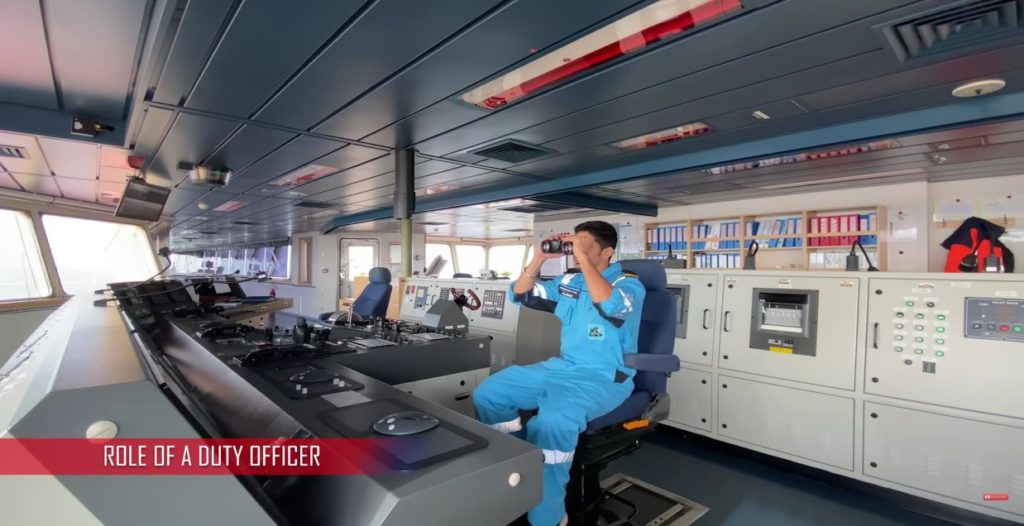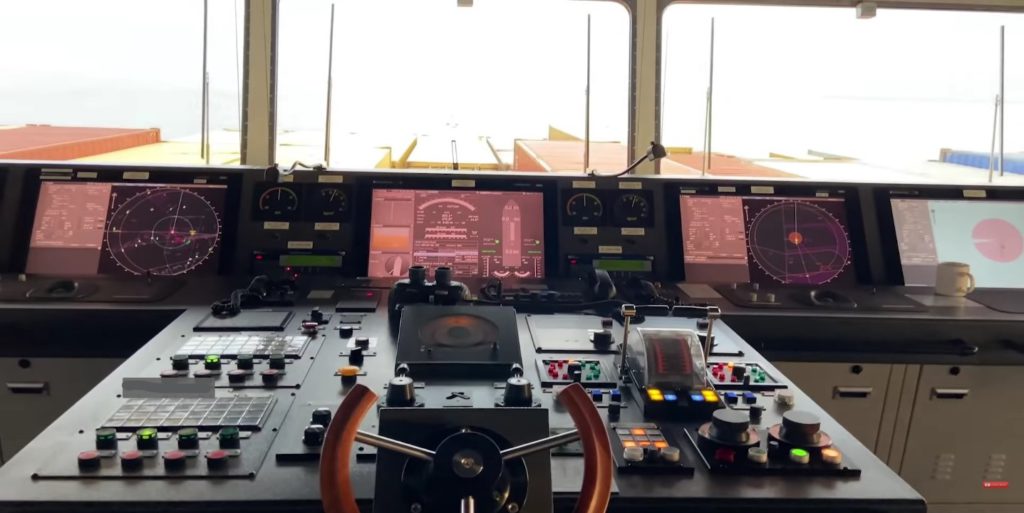Nautical Science vs Marine Engineering
Table of contents
It is critical to make the right decisions from the very beginning if one wants to have a successful career at sea. That being said, it is also natural to feel confused or anxious about which course or degree to pursue when starting out at a maritime institute, especially for those who do not have access to anyone from the industry directly. One such common question remains- ‘To choose Nautical Science or Marine Engineering?’

The choice of the Degree (Nautical Science or Marine Engineering) or Diploma plays a very crucial role here, for they are two very different paths to becoming an officer on a merchant ship. There have been instances where an individual has chosen one stream only to discover that it does not suit his/her academic interests or the prospects that they have envisioned for their career at sea. Leaving them with the harrowing option of changing to another.
Thus, it becomes critical to know ahead of time what field one intends to pursue and what job prospects they would hold later in life. To figure this out, let us first look at the basic differences between a Nautical Science and a Marine Engineering degree.
Nautical Science
The study of Nautical Science spans across multiple disciplines, such as Mathematics, Science, and Physics. It equips students with the techniques and knowledge required to safely navigate and operate a ship from one location to another. Further, it entails an understanding of the processes and functionalities associated with ship deck work and navigation. The course is a good mix of practical and theoretical instruction.
Successful completion of the course and acquisition of the degree lands the candidates on ships as deck officers.

Marine Engineering
On the contrary, Marine Engineering, is the branch of engineering that deals with the building and operation of all mechanical equipment found on seafaring vessels, harbour installations, and docks.
Marine Engineers are essentially responsible for the construction, and maintenance of structures and vehicles used inside, or in the vicinity of water. These include ships, aircraft carriers, tankers, sailboats, submarines, and so on. Marine Engineers further maintain the ship’s internal systems, which include the electrical, refrigeration, propulsion, and steering systems.
Both the fields of Marine Engineering and Nautical Science are equally important. For, from the largest vessels like aircraft carriers, submarines, yachts to the tiniest vessels like dinghies, each vessel that traverses the insurmountable oceans is meticulously crafted(designed) by the Naval Architects and, built and maintained by the careful Marine Engineers. So, while the vessels are maintained by Marine Engineers, individuals from Nautical Science operate and navigate it.
World Commerce along with national commerce, is heavily reliant on ships to convey oil and expensive commodities. Any technical issue arising in these ships during the voyage, need to be immediately resolved so as to minimize losses and disasters. Under such situations of crisis, Marine Engineers should be readily available, to address them promptly.
This field is especially critical for preserving international ties when on peacekeeping missions and during wartime. Submarines, destroyers, frigates, and aircraft carriers all play key roles. During every international event, ships must be gathered and action must be taken. National security is ensured. A marine engineer has the difficult task of ensuring that, in addition to functioning efficiently, the vessels are secure, easy to handle, and technologically advanced.
Roles and Responsibilities
The Monitoring and Maintenance of mechanical systems are significant duties and responsibilities in Marine Engineering. Employees of each rank are assigned specialised systems and machinery which they have to monitor and maintain.
Nautical surveyors’ roles and responsibilities include inspecting existing or new vessels to ensure that they are comply with various specifications and standards and are seaworthy. These include on-board machinery and equipment such as radios, navigational safety, and the structure. They are responsible for the overall condition and safety of a vessel and its cargo.
Scope and Career Opportunities
Nautical Science

There are several work prospects in this industry, particularly in technological fields. The job descriptions are as follows:
- Deck Cadet
- Third Officer
- Second Officer
- Chief Officer
- Captain
- Oceanographer
- Nautical Surveyor
- Harbor Pilot/ Harbor Master
Marine Engineering

There are numerous career opportunities available in the subject of Marine Engineering. One can look for work in such fields based on specializations. This field has a broader scope as well. It is not limited to the maintenance of seagoing vessels such as ships and boats, but also includes project management and control.
Private and public shipping enterprises both provide rich job opportunities, in India as well as overseas. The rank of a Marine Chief Engineer is equivalent to that of a Captain. Other job titles/opportunities in this field include:
- Sales Engineers
- Engineering Managers
- Submarine Designers
- Third Assistant Engineer
- Trainee Marine Engineer
- Junior Marine Engineer
- Structural Engineer
- Onshore Marine Coordinator
- Dry Dock Engineer
- Fourth Assistant Engineers
- Marine Equipment Designers
- Maintenance Engineers for Hotels, Hospitals & Malls etc.
Whether you want to join the Deck Department or the Engine Department there is a hurdle that you need to clear which is IMU CET. However, to get a good rank in IMU CET you need someone to guide you throughout the journey, and that someone is Merchant Navy Decoded with the free IMU CET Guidance Series that will help you to crack IMU CET on the first attempt and get a good rank, all for free.

Charting the Career Path
A cadet in Nautical Science must spend enough time at sea and get the necessary experience. Next, he must pass the requisite competency assessments and become certified. Only then he can apply for a position as a navigating officer and embark a commerce ship. A career in this sector begins with a trainee cadet officer or a deck cadet. A deck officer must have hands-on training, and this course teaches precise methods for operating and maintaining critical deck machinery.
One could be promoted from a Junior Officer to an OOW (Officer on Watch).

With the initial promotion comes the title of Third Mate or Junior Officer. However, the years of experience required for this position may vary depending on the shipping company. Chart work, collision prevention, navigation, bridge equipment, cargo handling etc. and other tasks necessitate a combination of academic and practical understanding. They are also exposed to managerial skills.
As a Deck officer, one is a member of the executive branch. And, the officer’s primary concern is the ship’s safe handling and navigation.
As a Nautical Surveyor, one is responsible for checking equipment for current and new vessels, as well as ensuring compliance of the vessel with numerous specifications and standards. This is about ships and cargo. Salary ranges here are between INR 6 – 8 lakhs.
A Marine Superintendent’s role is to ensure the efficiency and safety of vessel operations while being cost-effective. He / She is in charge of the execution and planning of shipyard repair work. Salaries for this position range from INR 15 to 20 lakhs.
Marine Engineers are mostly employed by private companies. They are in charge of the design, development, research, and building of new maritime boats and their components. They are also in charge of maintaining the existing vessels.
Some of the greatest jobs and internships are available after successfully completing this course. There are job opportunities in both the governmental and private sectors. GSI, SAIL, ONGC, Coal India, GMDC, and other reputable firms also provide career opportunities.
Training
These courses provide cadets with seafaring training. They are taught how to operate navigational and technological equipment on various sorts of seagoing vessels. Instruction is provided in nautical skills such as communication and navigation, as well as OOW or Officer on Watch training. They are also trained in environmental response, safety, rescue, safe freight transportation, alertness, and security threat response.
Marine engineering training is similar to other types of engineering training, but with a major emphasis on marine-related topics. It entails the following topics – ship structure and construction, marine engineering drawing, engine room management, naval architecture, marine machinery, and system design.
The Nautical Science programme is a three-year bachelor’s degree programme. Marine Engineering, on the other hand, is a four-year undergraduate degree programme.
To summarize, here we have a quick glimpse over the two degrees
Bachelors of Science in Nautical Science
- The course topic includes both academic and practical knowledge of seamanship.
- The study of nautical science encompasses the practical and fundamental technology required to properly sail and manage ships.
- The course is a three-year undergraduate degree programme.
- After completing this course, the average pay is INR 25000 – INR 50000 as a deck cadet which goes upto INR 10-15 lakhs per month as a Captain during their sailing period.
- A career in Nautical Science prepares you for a position as a deck officer.
- Nautical science prepares students for the safe operation and maintenance of ships. They also learn about navigation rules and regulations.

Bachelor of Technology in Marine Engineering:
- In Marine Engineering, students learn about designing, maintaining, operating, and repairing ships and their equipment. It concentrates on the ship’s technological elements. It focuses on both theory and practical understanding of vessel construction for usage at sea.
- A Degree in Marine Engineering prepares one to work as a ship’s engineer.
- This is a four-year undergraduate programme.
- The average salary earned after completing this course is INR 25000-50000 as a engine cadet which goes upto INR 10-15 lakhs per month as a chief engineer during their sailing period.
Conclusion
That being said, both the courses detailed here are exciting and offer unique employment prospects to an individual. Further, what one makes out of his profession, is entirely dependent on the individual, and choice of a career / profession must be made while keeping in mind about one’s interests, desires, ambitions and inclinations. And, to be fair, every coin has two sides, likewise each course has its pros and cons.
Both of these fields necessitate strong health and stamina, to survive as an engineer on ship or a Captain at the wheel. A course in Marine Engineering would lead to a position as Chief Engineer, while a course in Nautical Science would lead to a position as Captain. Both of them provide opportunities to work aboard ships or sea-going vessels. The shipping business offers exceptional job prospects and has grown in importance as a career over the last few decades. The industry contributes significantly to a country’s growth and economy.
Further, the salary structure of both the fields are quite similar, and are dependent on experience and rank over time. To conclude, both of them are dependent on one another and co-exist, so the choice largely remains on the interest and ambition of the individual.
Disclaimer :- The opinions expressed in this article belong solely to the author and may not necessarily reflect those of Merchant Navy Decoded. We cannot guarantee the accuracy of the information provided and disclaim any responsibility for it. Data and visuals used are sourced from publicly available information and may not be authenticated by any regulatory body. Reviews and comments appearing on our blogs represent the opinions of individuals and do not necessarily reflect the views of Merchant Navy Decoded. We are not responsible for any loss or damage resulting from reliance on these reviews or comments.
Reproduction, copying, sharing, or use of the article or images in any form is strictly prohibited without prior permission from both the author and Merchant Navy Decoded.




Thank you so much sir for this wonderful blog. This blog is very useful and informative to me. Sir my name is vishal kumar and now I am pursuing my diploma in mechanical engineering in 6th semester it is my last semester sir i am little bit confuse between what should I do either I do btech marine engineering or I should do diploma in marine engineering sir please throw light on this topic. And one more question sir i had go through the site of ims Goa i have seen their that most of the shipping company is Indian pvt ldt company so these types of companies are good or not because as we all know that the wages are comparatively low in Indian companies to the foreigners companies please clear my doubt sir. Thank you
IMS Goa is a good college to start with and can you name the companies that come for placement at IMS Goa for DME ?
Some companies that comes for placement in ims Goa are:-
1. Scorpio Marine management India Pvt Ltd.
2. Wallem shipmanagement.
3. V ships india pvt ltd.
4. Asp shipmanagement India Pvt Ltd.
5. Wilhelmsen shipmanagement pvt Ltd.
6. K line shipmanagement pvt ltd.
Sir please guide me should I go for ims Goa . As I told you that most of the companies are India Pvt Ltd.
How to join Indian Navy after Bsc Nautical Science
CDS is one good option
Looking forward to a marine engineer what are the course needed to be an outstanding marine engineer
Hi samuel, hope you doing well.
To be a good marine engineer, you should start working on your knowledge, working on basic concepts will help you in gaining that confidence and definitely in earning respect on ship.
Combo course will surely help you in clearing your basics and fundamental concepts as it includes practical engine room rounds as well.
Here, you can checkout which all topics are covered in combo course.
https://youtu.be/kqdPXgjodXQ
Link to the course is
https://www.merchantnavydecoded.com/courses/c/
– Team merchant navy decoded
Hello sir, am a Nigerian student who recently got admitted to study B.Tech marine engineering in school of maritime studies, centurion university, odisha, India.
Please sir am a little bit confused about maritime studies because i have never thought of studying it, it came as an opportunity to me and I didn’t hesitate to accept it while i was in my 3rd year of studying Bachelor of science in Geography at my home town university.
Its after i got admission to study marine engineering that’s when i learn about it’s two branches i.e nautical science and marine engineer, As a geography student i thought nautical science will be suitable for me.
Lastly, how much do you know about centurion university and how good it is, also will i be able to get work abroad after i have successfully complete the study.
Thank you
https://www.merchantnavydecoded.com/btech-marine-engineering/
We only recommend these colleges.
Team merchant navy decoded
Hello sir. I am from Pakistan I have some questions about marine engineering and nautical science if you don’t mind can I contact with you
Hi Sulaiman Jadoon,
Yes sure you can contact us on Team Merchant Navy Decoded Official number 7417349366.
Thankyou
Team Merchant Navy Decoded